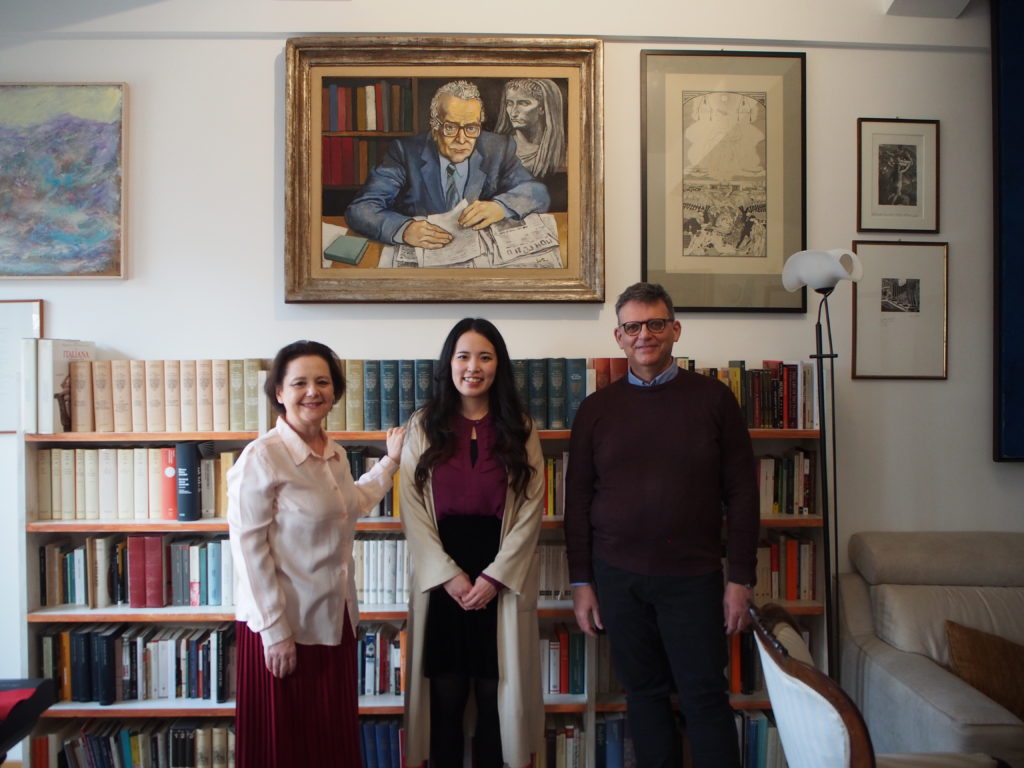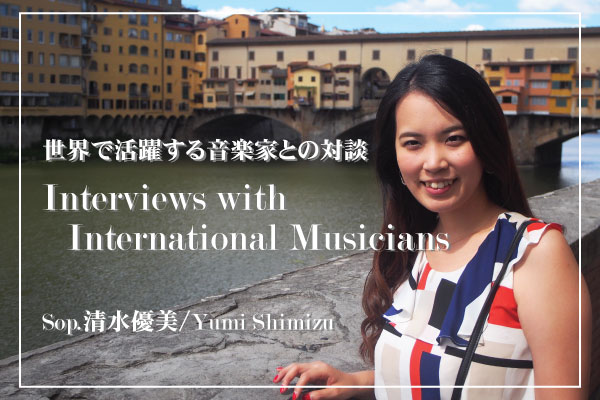
For this new column, I speak with Luisa Prayer (pianist) and her husband Marcello Bufalini (conductor). Both are from Rome but have great international careers. Luisa started playing the piano at a young age and then studied at prestigious schools. During her study, she already started her international career, with regular visits to Japan as well. Now she teaches at the Conservatory of Milan. Marcello also started with the piano and then other instruments and composition, but in the end he chose conducting. He works in many countries and teaches at the Conservatory of L’Aquila. I met Luisa and Marcello at their home in Milano, where they moved a couple of years ago.
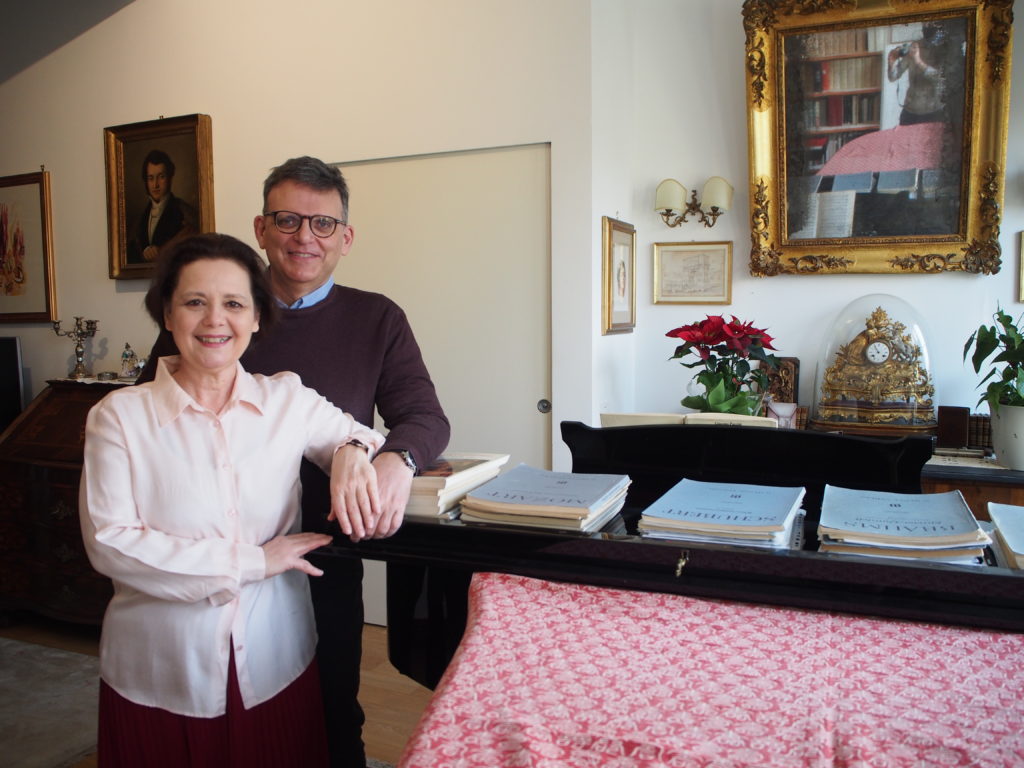
-Thanks for this great opportunity! My first question is, how did you fall in love with music?
Luisa: I will reply first. In my family there were no musicians but my parents definitely loved music and wanted for me a musical education. When I was 8, my brother and I started to study piano, something that ultimately turned out to be quite easy for me. Therefore we understood that it could be something to develop. Once I had to decide whether to study at university or to focus on music instead, I decided to go to the Conservatory in Rome. I got my diploma at 20, then I went to the Mozarteum in Salzburg, where I got another diploma in piano. I then specialised further at Rome’s Santa Cecilia National Academy and then as many musicians I started my concerto activity and further specialisation courses with maestros like Paul Badura-Skoda and Bruno Canino, an important Milanese pianist, then also at the Accademia Chigiana in Siena. I also went to the Okinawa Festival in Japan, which does not exist anymore, but for many years it has been directed by Shuku and Ko Iwasaki, she is a pianist and he’s a cellist, two distinguished Japanese musicians. So it was courses and concerts, with teachers coming from all over the world and I had met Shuku Iwasaki at the Accademia Chigiana in Siena, she’s the one who invited me to Okinawa and there I encountered Japan, where I came back many times later. Working with Shuku Iwasaki, whom I also invited in Italy to play with me, her brother Ko and violinist Watanabe Reiko (who had won the Paganini prize and I met when she was only 16), we continued to see and play together for many years.
Thanks to the talent and organizational skills of an extraordinary woman called Sachiko Morimoto of the Nikon Keizai Shinbun’s arts section, who invented a series of concerts held in Japanese museums, we toured most Japanese cities and also visited those museums. It has been an insight in Japanese culture and even gastronomy, it has been a key experience in my musical and cultural life.
Besides, there’s a legend that says that there are Japanese origins in my mother’s family, far away in time, which originated in a Japanese embassy to the Pope in the 16th century. It was therefore emotional to bring my mother to Japan during one of these voyages. So, Japan for me has been a land of many satisfactions, of musical and non-musical friendships.
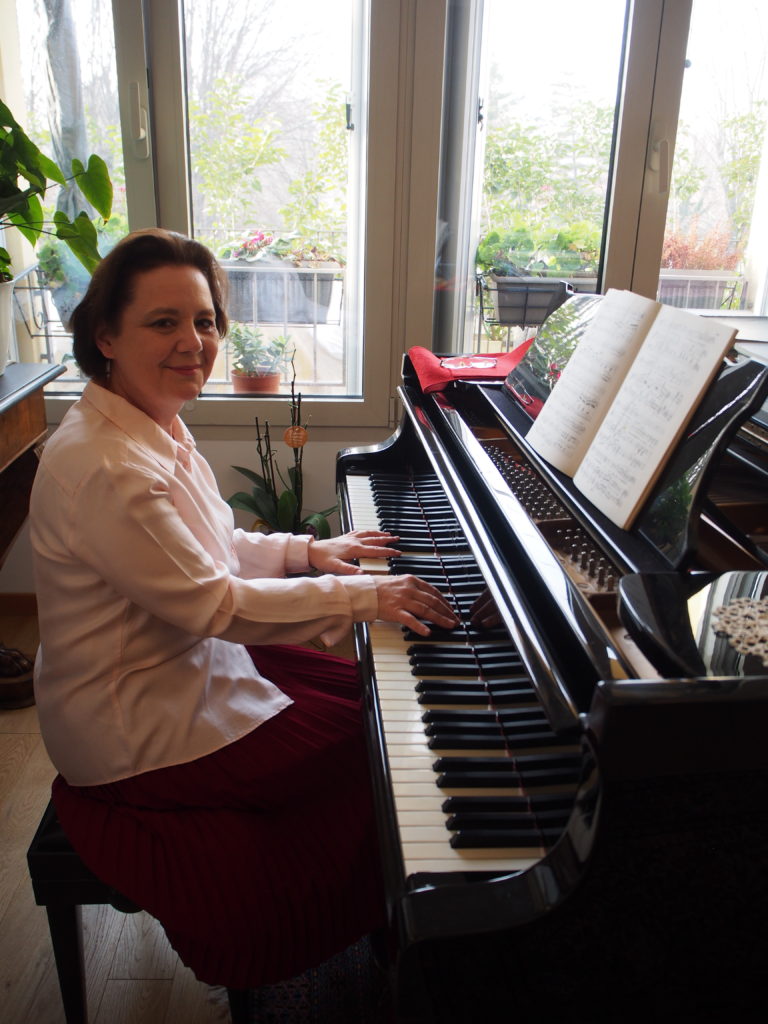
-Wow, so you have a great connection with Japan, I’m glad about it!
Luisa: Yes, it’s a land that I like very much, I respect Japanese culture and arts very much. Musical life is also great, the public has much interest, the concert halls are wonderful, I loved doing these tours. Talking about Japanese pianos… I have a Steinway here at home, there’s an important Italian piano technician called Angelo Fabbrini who used to work with Benedetti Michelangeli and also when Pollini and others go to Japan for concerts they go with his pianos. So I love Steinway but in Japan I played on some wonderful Yamahas and Japanese technicians are also so skilled.
-Thanks Luisa and what about Marcello’s musical connection?
Marcello: the beginning of the story is very similar, a family of non-musicians but much love for music and many classical music records, which I started to play as a child, alone. When my parents noticed that I spent my days listening to Beethoven and others, they said maybe we can have him study piano and that’s where I started, at around 10 years old. However, my favourite instrument was the violin, so I entered the Conservatory and studied violin, but I got my diploma in viola at 20 years old and then went on studying. After some studying of composition I also got a diploma in Conducting at Rome’s Conservatorio.
-So you really did many things.
Marcello: Yes, all these things, and I was also a young violist with the youth orchestra of the European communities. Then I also played for some time at the Accademia Nazionale di Santa Cecilia. Much experience and encounters with great conductors.
When I was 20 years old I stopped playing instruments because I wanted to focus on conducting, so I had that diploma in Rome. I also studied abroad, in England, Romania and back in Italy at the Accademia Chigiana, with maestros like Valery Gergiev, the great korean conductor Myung-Whun Chung and I then started my activity both in Italy and abroad, mostly in german-speaking countries and France. At the same time I focused on teaching, another great passion of mine; I taught viola for many years and then conducting in L’Aquila, where I have been teaching for 24 years with many students, some of which became famous.
-How did you meet?
Marcello: We met while teaching, as colleagues therefore. We attended the same schools without ever meeting!
Luisa: We both lived in central Rome, with common friends, but without ever meeting.
-I want to go through your education a little bit more, Luisa studied at Rome’s Conservatory first, then at the Mozarteum and Santa Cecilia, right?
Luisa: Right, then the additional courses in Siena, but all the other experiences in Okinawa or in Milan or the Netherlands were useful: taking part to festivals that invite young musicians to play with the professionals is also very important. I also forgot to mention that I have been invited to play with Gerhard Oppitz, at the courses of Beethoven interpretation at Wilhelm Kempff’s house (an important German pianist in Positano), which Kempff organised for decades every summer for young musicians. When he died Oppitz continued for some time, I was invited one year and that was also a key moment in my education.
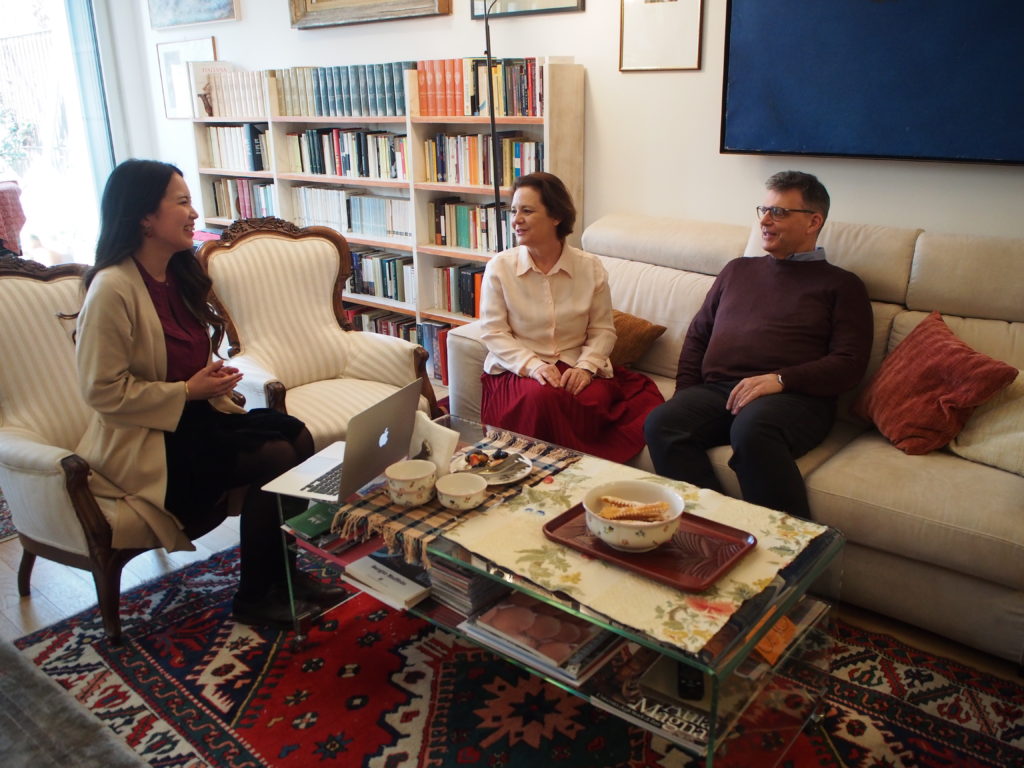
-Among the readers of this interview there will also be students willing to study abroad. Did you find much difference between studying in Italy and overseas?
Luisa: when we were studying, each country had its system, whereas today at least in Europe it’s more similar. Then of course each country has a different approach and tradition and that’s where I noticed some difference. My maestro, pianist Sergio Cafaro, was also a composer and therefore was very strict and rigorous; this helped me when I went to Salzburg where I studied with another maestro, Gilbert Shooter, who had studied with Furtwaengler. For me in particular it was however playing within an orchestra that allowed me to go in depth into matters. Playing with violinist Rainer Honeck, who’s very famous also in Japan, for 10 years (mostly Mozart, Schubert, Beethoven) also helped me: it’s important to play also with musicians of your own age, but who can give you something.
-Indeed, the relationship with other musicians is key. What about Marcello?
Marcello: As a student, as I already mentioned, I studied viola at Rome’s Conservatory and at Fiesole’s music school, which is also quite famous. It was established as a private school but it comes from a very important person in Italian classical music, Piero Farulli, who died a few years ago and who has been for thirty years a violinist in the most famous string quartet, the Quartetto Italiano. He founded this school where I studied many years the instrument and chamber music.
There were Italian students from every city, from Milan to Naples, Bolzano to Palermo and we met once a month and played a lot. It was an extraordinary driver of growth for me and my musical skills. Then I studied conducting at Rome’s conservatory and with Bruno Aprea. I learned very much in those years, there were very beautiful concerts.
Then I took summer classes, not proper academies like Luisa. I went to the Dartington Summer School of Music in England, also very important, for two seasons.
-So your career started quite early?
Marcello: Relatively so, at 29 years. I had already a good number of contacts by then and I didn’t want to continue to have a student’s life for years.
-It’s not easy to define when a career starts, what would you say about you?
Marcello: yes, there is never a precise moment, but somehow yes in 1994 I was invited by Fabio Luisi, principal conductor at Graz Symphony Orchestra and he invited me for a concert and then for more until I became principal guest conductor. So that’ where my international career actually started.
-What about you, Luisa?
Luisa: You know, I started to play at concerts quite soon (17, 18 years old) and I did so in most European countries and then in the United States, Japan and China, especially with other musicians in trio or duo formation, for example with Luigi Piovano, first cellist at Santa Cecilia’s Academy. So there was no proper moment for a start of a career, it started and developed quite harmoniously. I believe studying in Salzburg was key for creating a network of relationships, especially with Austrian and German musicians. Knowing the German language also helped me much in developing that repertoire, of German opera and lieders, a great passion of mine. If you work with singers, you really need to know the language in which they sing, so German was a first choice and then Italian repertoire but not the operatic one, from the 19th century onwards, with Tosti etc.
– Why did you move from Rome to Milan?
Luisa: I now work at Milan’s conservatory. I had this opportunity and was very curious, after having worked for so long in Rome. Additionally we had many friends in Milano and we knew we’d have gone to a city where we’d be welcomed and so it has been. The same happened with my colleagues at the Conservatory. Then we have a son who lives in Bologna as an artist and he works in Nothern Italy so moving to Milan was a combination of cultural curiosity and family reasons.
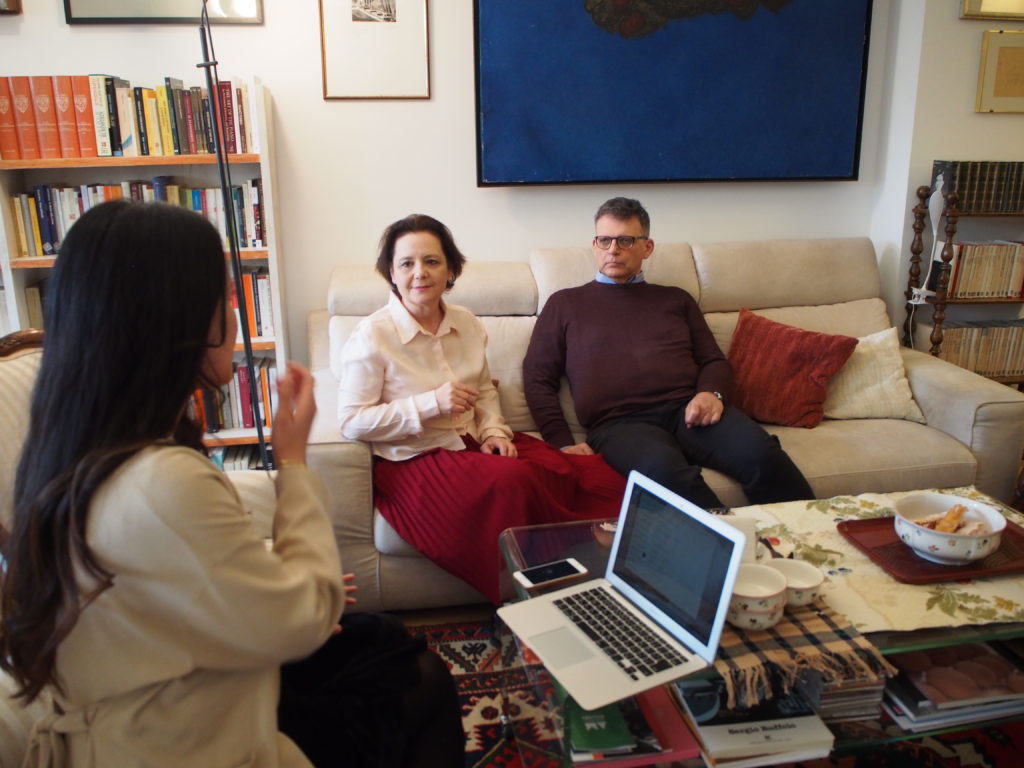
-I went several times to Rome but I never lived there. Is there much difference in musical matters?
Marcello: Rome’s institutions are of higher level and are very important, with the Teatro dell’Opera (although not as famous as La Scala in Milan) and a symphony orchestra and Santa Cecilia’s National Academy orchestra which is one of the most important in Italy. The level is indeed very high with important maestros like Daniele Gatti and very interesting productions; additionally there are also some beautiful chamber orchestra seasons. At the same time, perhaps the conservatory and musical life is less dynamic.
Luisa: Milan’s conservatory has more activities and is more musically alive, also in the way it spreads itself into the city’s cultural life. It is somehow more European in its offer. There is also a greater interest and demand from the students’ side to study in Milan. There are many young students who are willing to study in Milan, not just classical music but also pop etc. There are also a good number of orchestras and each year they invite new directors from abroad in order to stimulate students.
-Does Luisa also teach privately to students?
Luisa: Not much nowadays as I don’t have much time; besides, the Conservatory is the place for such activities. I am very happy to teach there and then I am also busy with concerts. For many years I was also musical director of a 15 years long festival and that was also very engaging for me.
-Oh yes, I saw on the internet.
Luisa: And then I was also the musical director of a national orchestra for two and a half year, both activities have been very challenging. Almost at the same time of the first lockdown I started to focus again on teaching and piano.
-What about your own festival?
Luisa: It was called “pietre che cantano” (singing stones) and I managed it from 2000 to 2015 in L’Aquila, because I was teaching at the conservatory there. It always had important international guests.
Additionally, I am also busy with research activity. For example, last year I edited of a book about Italian composer Alfredo Casella, quite a thorough volume and of course it takes time to work on such activities. I think there are many ways of being an artist and developing one’s skills, also by studying and writing.
-Going back to your teaching activity, is there anything you think about specifically when you teach to students, for them I mean.
Luisa: I think it’s important for them to have a full development of their artistic and musical personality. Talent is key and a natural technical and physical predisposition, but it is also important to have solid bases, where you study and with whom. So I always tell students, pay attention to the maestros you choose, choose the best, because this will allow you to develop your skills. For international students, it’s also important to develop their general cultural knowledge. Some composers lived in specific contexts, in order to play their works one must understand the historical and cultural context. It is also vital to learn the language, so to have a personal way of reading and performing music and developing a full artistic personality. Asian students are particularly good at doing this, they have a great ability to concentrate and study and a great motivation and courage in being abroad for studying; language remains key because if you master it you can really absorb it all.
-How many international students do you have?
Luisa: Almost half of my classes. There are many in Milan. I have Japanese, Korean, Chinese and other European students.
-What about Marcello, what is your view on teaching?
Marcello: well, music has many different meanings, from an artistic, technical, cultural, psychological level. There is so much and teaching is never enough for students to understand it all, however of course teachers provide the basics, the main ideas, a sufficient technical and artistic standard. It especially difficult for teaching conducting, you have so many challenges, from practical issues to the most deep artistic matters. While students of instruments have a close relationship with their teachers and their instrument, for a conductor it’s impossible: they need a full orchestra, 20 to 50 people with whom to practice and it’s a challenge, it’s difficult to find it and to have institutions providing it. You can find a good piano in almost every city, you can’t always find an entire orchestra. Milan is a good place for this but of course it’s expensive for students, it means moving to another city. And here we could say many things, but I will say two. On one side, many students struggle to understand how much practice conductors need and how difficult it is to practice. Which are the small problems, how a rehearsal works, how the relationship works, how to speak etc. On the other side for me I’d say that the technical side is key but it is only instrumental to understanding what you are doing. The character of music, its meaning, its importance, its expressivity and content, the artistic side. Of course you need the means to do it, as anything else, but I do not see the value of being a conductor if you have no artistic ideas.
– In Japan, as students, we learn technical matters or solfège at university, so it’s easy for us to read scores, but sometimes it’s difficult to express ourselves.
Marcello: Yes, the technical part is a mean, an instrument. Of course one needs that, but after that what do you do with it? It’s a matter of culture. If you want to develop a career in classical music, you need to go to study to Europe or the US, because that’s where it was born and was developed. Japanese musicians are very good and level is high, especially when they travel and take part to international concerts, also in the Americas. In the US many teachers have European origins, many fled there during WW2, so there has been a kind of a transfer of European cultural tradition and I mean European because most of the classical repertoire is European, apart from Aaron Copland and Universe or John Adams. Also in South America one can study with maestros with Hungarian or Russian or Jewish or Polish origins.
Luisa: So, a European perspective is key, especially if one knows literature, art and music. I regularly talk about this to my students and tell them to do research on the historical context, understanding the great movements like Romanticism, Decadentism etc. It’s important not to find just any expression, because then you only talk about yourself, whereas it has not to be the case. I must understand if Beethoven talks about me, because he talks about man. I must understand the ideas of Beethoven. When for example I find two completely different composers, what is it? Why are they different? How do I cope with that and how do I have to differ? It’s important to reply to these questions.
-Thanks, very interesting! One final question, with this pandemic many students have had plenty of difficulties and some stopped studying abroad. Maybe now we’re getting out of the emergency. But what would be your suggestion for students in this moment?
Marcello: Well, not easy, it’s a difficult moment for everybody, however one must do as much as possible. I am now going to Germany where there will be social distancing in the classes with singers and orchestra and a mandatory COVID test every day, but we have to go on and do as much as possible, within what is permitted. Another thing we can do today is read and listen, we have all technological means to do research, watch videos, listen to recordings so you can study very much and take advantage of this time to listen to operas which you never heard before or to read books you did not have enough time to read. Had this pandemic happened thirty years ago, we simply wouldn’t have had the technology and we couldn’t have had these possibilities.
Luisa: I think that students must continue to ask to do much. They need to be helped, also by their own countries, they need support in order to understand what to do in the country of destination and feel safe. At this time the dialogue between cultures remains very important and it is important that the great schools, orchestras, foundations continue to invite maestros from abroad, allow their students to continue to make new experiences. We need to support the young generation as much as possible, as parents, teachers, civil society, as government etc. I think it’s especially the young generation who suffered most from these lockdowns. One of the key things to do once you are young is discover the world and if you can’t you need help. It’s important to have this awareness, from European countries, from Italy, from Japan and elsewhere, to support talents and young people who want to study and learn, to help them to travel and to allow them to meet international artists in their country. This is very important for the young generation’s education.
